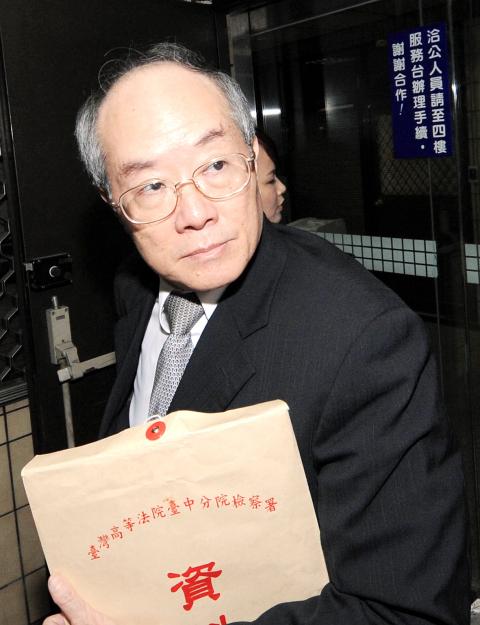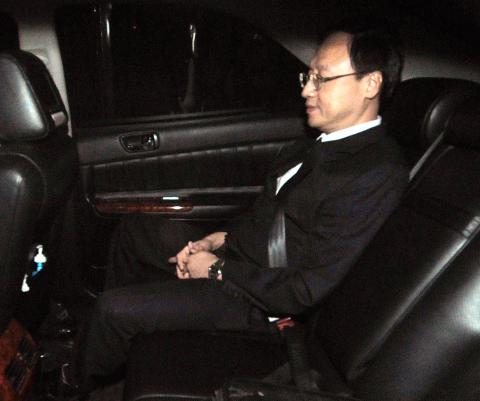President Ma Ying-jeou (馬英九) was summoned by the Taipei District Prosecutors’ Office yesterday evening as a witness in a case involving Prosecutor-General Huang Shih-ming’s (黃世銘) alleged leaks of details of an investigation into allegations of improper lobbying against Legislative Speaker Wang Jin-pyng (王金平).
Premier Jiang Yi-huah (江宜樺) and former Presidential Office deputy secretary-general Lo Chih-chang (羅智強) were also subpoenaed as witnesses last night.
Ma, Jiang, Huang and Lo were questioned individually.

Photo: Taipei Times
Ma is the second sitting president to testify as a witness. Then-president Chen Shui-bian (陳水扁) testified in Hualien County as a witness in a corruption case in 2004.
Neither Ma nor Jiang appeared before reporters after their visits to the prosecutors’ office and did not issue any statements.
However, Huang, who has been listed as a defendant in the investigation, said he is innocent.

Photo: Taipei Times
“I have no regrets at all about what I did. I did not do anything wrong that let Taiwanese down, nor did I do anything that has tarnished the position of prosecutor-general. I am sticking to what I have done and I will keep doing it,” Huang told reporters after he was questioned.
Lo declined to reveal details of his testimony, saying: “It takes courage to stand on the same side as Ma, which is the side of the minority at this moment.”
He resigned on Sept. 12, citing the improper lobbying scandal, as well as family and personal reasons for his decision to quit.
The prosecutors’ office began its investigation yesterday after several lawyers and citizens filed lawsuits against Huang over the alleged leaking of secrets in the Supreme Prosecutors’ Office Special Investigation Division’s (SID) probe into a case involving Wang and Democratic Progressive Party caucus whip Ker Chien-ming (柯建銘).
The prosecutors summoned Ma to clarify the details of meetings he had with Huang on Aug. 31 and Sept. 1, five days before Huang called a press conference to accuse Wang of the misconduct.
Ma has previously defended the legitimacy of his private interactions with Huang and dismissed allegations that he had instructed Huang on how to handle the allegations against Wang, but said that, as a citizen, he was obligated to testify in court. He also said that his testimony would be able to help prosecutors and he did not think his appearance before them would have a negative effect on the presidency.
The Presidential Office notified the Taipei District Prosecutors’ Office yesterday afternoon that Ma was available to report to the office last night. Ma arrived at the prosecutors’ office at about 8pm, taking a secret passageway to avoid reporters. Huang was already being questioned when Ma arrived.
Both Ma and Huang have said that the allegations against Wang involve administrative misconduct and that it is not a criminal case.

Tropical Storm Gaemi strengthened into a typhoon at 2pm yesterday, and could make landfall in Yilan County tomorrow, the Central Weather Administration (CWA) said yesterday. The agency was scheduled to issue a sea warning at 11:30pm yesterday, and could issue a land warning later today. Gaemi was moving north-northwest at 4kph, carrying maximum sustained winds near its center of up to 118.8kph and gusts of 154.8kph. The circumference is forecast to reach eastern Taiwan tomorrow morning, with the center making landfall in Yilan County later that night before departing from the north coast, CWA weather forecaster Kuan Shin-ping (官欣平) said yesterday. Uncertainty remains and

SEA WARNING LIKELY: The storm, named Gaemi, could become a moderate typhoon on Wednesday or Thursday, with the Taipei City Government preparing for flooding A tropical depression east of the Philippines developed into a tropical storm named Gaemi at 2pm yesterday, and was moving toward eastern Taiwan, the Central Weather Administration (CWA) said. Gaemi could begin to affect Taiwan proper on Tuesday, lasting until Friday, and could develop into a moderate typhoon on Wednesday or Thursday, it said. A sea warning for Gaemi could be issued as early as Tuesday morning, it added. Gaemi, the third tropical storm in the Pacific Ocean this typhoon season, is projected to begin moving northwest today, and be closest to Taiwan on Wednesday or Thursday, the agency said. Today, there would likely

DISRUPTIONS: The high-speed rail is to operate as normal, while several airlines either canceled flights or announced early departures or late arrivals Schools and offices in 15 cities and counties are to be closed today due to Typhoon Gaemi, local governments announced last night. The 15 are: Taipei, New Taipei City, Taoyuan, Tainan, Keelung, Hsinchu and Kaohsiung, as well as Yilan, Hualien, Hsinchu, Miaoli, Chiayi, Pingtung, Penghu and Lienchiang counties. People should brace for torrential rainfall brought by the storm, with its center forecast to make landfall on the east coast between tonight and tomorrow morning, the Central Weather Administration (CWA) said. The agency issued a sea warning for the typhoon at 11:30pm on Monday, followed by a land warning at 11:30am yesterday. As of

CASUALTY: A 70-year-old woman was killed by a falling tree in Kaohsiung as the premier warned all government agencies to remain on high alert for the next 24 hours Schools and offices nationwide are to be closed for a second day today as Typhoon Gaemi crosses over the nation, bringing torrential rain and whipping winds. Gaemi was forecast to make landfall late last night. From Tuesday night, its outer band brought substantial rainfall and strong winds to the nation. As of 6:15pm last night, the typhoon’s center was 20km southeast of Hualien County, Central Weather Administration (CWA) data showed. It was moving at 19kph and had a radius of 250km. As of 3pm yesterday, one woman had died, while 58 people were injured, the Central Emergency Operation Center said. The 70-year-old